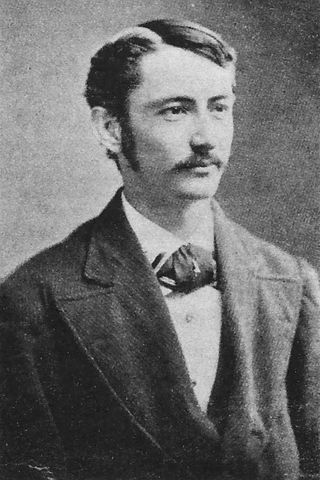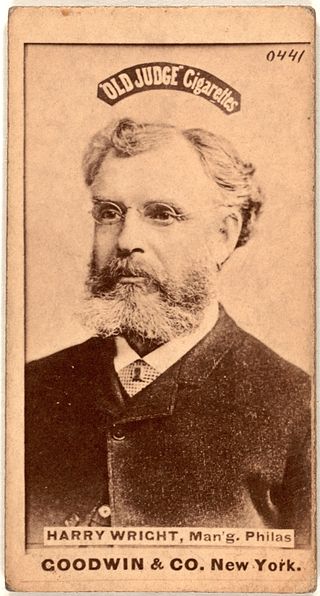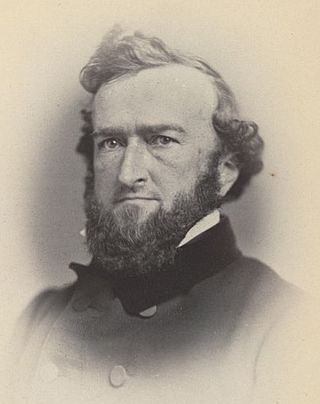
1859 in sports describes the year's events in world sport.
1860 in sports describes the year's events in world sport.

William Arthur "Candy" Cummings was an American professional baseball player. He played as a pitcher in the National Association of Professional Base Ball Players, and National League. Cummings is widely credited with inventing the curveball. He was elected to the Baseball Hall of Fame in 1939.
The question of the origins of baseball has been the subject of debate and controversy for more than a century. Baseball and the other modern bat, ball, and running games – stoolball, cricket and rounders – were developed from folk games in early Britain, Ireland, and Continental Europe. Early forms of baseball had a number of names, including "base ball", "goal ball", "round ball", "fetch-catch", "stool ball", and, simply, "base". In at least one version of the game, teams pitched to themselves, runners went around the bases in the opposite direction of today's game, much like in the Nordic brännboll, and players could be put out by being hit with the ball. Just as now, in some versions a batter was called out after three strikes.
The Cincinnati Red Stockings of 1869 were baseball's first all-professional team, with ten salaried players. The Cincinnati Base Ball Club formed in 1866 and fielded competitive teams in the National Association of Base Ball Players (NABBP) 1867–1870, a time of a transition that ambitious Cincinnati businessmen and English-born ballplayer Harry Wright shaped as much as anyone. Major League Baseball recognized those events officially by sponsoring a centennial of professional baseball in 1969.

William Henry "Harry" Wright was an English-born professional baseball player, manager, and developer. He assembled, managed, and played center field for baseball's first fully professional team, the 1869 Cincinnati Red Stockings. He is credited with introducing innovations such as backing up infield plays from the outfield and shifting defensive alignments based on hitters' tendencies. For his contributions as a manager and developer of the game, he was inducted into the Baseball Hall of Fame in 1953 by the Veterans Committee. Wright was also the first to make baseball into a business by paying his players up to seven times the pay of the average working man.
Town ball, townball, or Philadelphia town ball, is a bat-and-ball, safe haven game played in North America in the 18th and 19th centuries, which was similar to rounders and was a precursor to modern baseball. In some areas, including Philadelphia and along the Ohio River and Mississippi River—the local game was called Town Ball. In other regions the local game was named "base", "round ball", "base ball", or just "ball"; after the development of the "New York game" in the 1840s it was sometimes distinguished as the "New England game" or "Massachusetts baseball". The players might be schoolboys in a pasture with improvised balls and bats, or young men in organized clubs. As baseball became dominant, town ball became a casual term to describe old fashioned or rural games similar to baseball.

James Creighton, Jr. was an American baseball player during the game's amateur era, and is considered by historians to be the sport's first superstar and one of its earliest paid competitors. In 1860 and 1862 he played for one of the most dominant teams of the era, the Excelsior of Brooklyn. He also was reputed to be a superb cricketer, and played in many amateur and professional cricket matches.
Putnam Grounds can refer to two nineteenth century baseball stadiums.

The Atlantic Base Ball Club of Brooklyn was baseball's first champion and its first dynasty. The team was also the first baseball club to visit the White House in 1865 at the invitation of President Andrew Johnson.
The National Association of Base Ball Players (NABBP) was the first organization governing American baseball.
The Capitoline Grounds, also known as Capitoline Skating Lake and Base Ball Ground, was a baseball park located in Brooklyn, New York from 1864 to 1880. It was built to rival nearby Union Grounds, also in Brooklyn. The park hosted local amateur teams in its early history, but later hosted professional and semi-professional games. The park's only season as the home field for an all-professional team occurred in 1872 when the Brooklyn Atlantics joined the National Association of Professional Base Ball Players. The park was flooded during the winter and used as an ice skating park. The grounds were used by local high schools and colleges as well, to play American football games, and ice rink football matches.
The following are the baseball events of the years 1845 to 1868 throughout the world.

Asahel "Asa" Brainard, nicknamed "Count", was the ace pitcher of the original Cincinnati Red Stockings, the first fully professional baseball team, after having pitched for the Excelsior club of Brooklyn, New York.

Owen Jones was an American politician from Pennsylvania who served as a Democratic member of the U.S. House of Representatives for Pennsylvania's 5th congressional district for one term from 1857 to 1859. During the American Civil War he raised a troop of cavalry that would become Company B of the 1st Pennsylvania Cavalry Regiment and served as colonel.
The Massachusetts Game was a type of amateur club baseball popular in 19th century New England. It was an organized and codified version of local games called "base" or "round ball", and related to Philadelphia town ball and rounders. The Massachusetts Game is remembered as a rival of the New York Game of baseball, which was based on Knickerbocker Rules. In the end, however, it was the New York style of play which was adopted as the "National Game" and was the fore-runner of modern baseball.
William H. Lennon was an American Major League Baseball player born in Brooklyn, New York. He played catcher for three seasons in the National Association from 1871 to 1873, and managed 14 games for the 1871 Fort Wayne Kekiongas. Lennon also played first base, shortstop, third base, and right field during his professional career. He worked a total of 15 National Association games as an umpire between 1871 and 1874.
The Enterprise Base Ball Club of Brooklyn was an American baseball club in the 1850s and 1860s.

Fairmount Rowing Association is an amateur rowing club, founded in 1877. The facility, located at #2 Boathouse Row in the historic Boathouse Row of Philadelphia, Pennsylvania, is on the National Register of Historic Places. Fairmount originally catered to blue-collar youths living in the Fairmount neighborhood. In 1916, after decades of being rejected, the club was finally allowed to join the Schuylkill Navy. The Club boasts being known as the "premiere club for Masters rowing in the mid-Atlantic region" and has produced several world class rowers.

Francis Pidgeon Sr. was an American baseball pitcher. He played for Eckford of Brooklyn from 1855 to 1862, and was one of the club's founders. Pidgeon has been called one of the top pitchers of the era, and participated in New York-area all-star games in 1858. Playing as an amateur, Pidgeon vigorously opposed payments to baseball players and authored a law banning them in the National Association of Base Ball Players (NABBP). After professionalism began spreading, he left the Eckford club before sponsoring an unsuccessful resolution opposing player pay in 1870. Pidgeon worked as a contractor before being hit by a train and killed in 1884.











